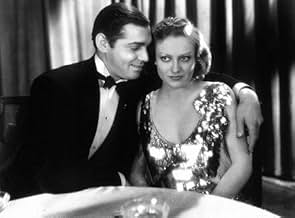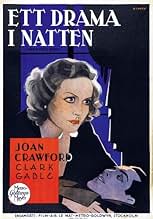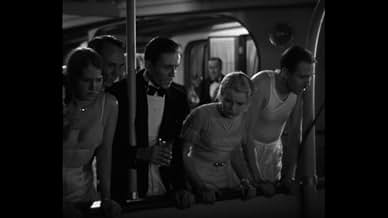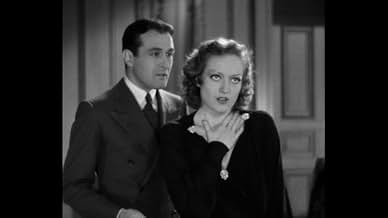After the death of her father and loss of the family fortune, Bonnie (Joan Crawford) gets a job as a cub reporter while her brother (William Bakewell) becomes involved in bootlegging.After the death of her father and loss of the family fortune, Bonnie (Joan Crawford) gets a job as a cub reporter while her brother (William Bakewell) becomes involved in bootlegging.After the death of her father and loss of the family fortune, Bonnie (Joan Crawford) gets a job as a cub reporter while her brother (William Bakewell) becomes involved in bootlegging.
- Director
- Writers
- Stars
- Awards
- 1 win total
- Wally
- (as Earl Foxe)
- Parker
- (as Purnell B. Pratt)
- Luva's Henchman
- (uncredited)
- Albert
- (uncredited)
- Yacht Waiter
- (uncredited)
- Clinton
- (uncredited)
- Chorus Girl
- (uncredited)
- Reporter
- (uncredited)
- Director
- Writers
- All cast & crew
- Production, box office & more at IMDbPro
Featured reviews
A safe trip in a Time Machine to somewhere particularly unsafe
The other option for employment seemingly was to become a journalist - perhaps not such an easy option but unlike her brother's unwise career plan, that's what Joan Crawford's Bonnie does when they become broke. Incidentally, women journalists and women writers, especially in Hollywood, although the exception were not that uncommon. Indeed the writer of this film, Aurania Rouverol, was a noted female playwright.
As a work of fiction, this is perhaps Miss Rouverl's greatest achievement. The plot is quite nonsensical but in the magical hands of Irving Thalberg's team at MGM, you're swept along with this stupid story, accepting it all as perfectly normal.
MGM was the last of the studios to make the switch from silents to sound and as such talking pictures were still a novelty to the studio when this was made. This is very much evident with this. The most sophisticated and classiest silent films were often from MGM and they couldn't abandon that style they'd built up over all those years so easily. Like in the 20s, in this film, faces and expressions are used to tell the story and nobody was better at that than Joan Crawford. The story allows her to really develop her character and her experience one of the leading silent stars ensures first rate acting.
Clark Gable, in one of his very first roles is only swaggering around for about twenty minutes but he makes quite an impact. Although he is a one-dimensional nasty piece of work, he has an electrifying presence. His on-screen (and subsequent off-screen) romance with Miss Crawford also gives this film an authentic undercurrent of sexual tension. This and the overall high standard of acting (much better than in some other offerings from 1931) again helps to keep this crazy plot seem real. Even so, as a motion picture, it doesn't quite hit the mark but is nevertheless still entertaining.
Joan Goes To Work
In fact when Dance Fools Dance came out Crawford was already shooting another film, Laughing Sinners with Neil Hamilton and Johnny Mack Brown as her leads. The reviews Gable got made Louis B. Mayer scrap all the footage that had been shot with Brown and Gable was immediately recast in that picture.
Crawford and William Bakewell play a couple of rich kids whose father William Holden loses everything in the Crash of 29 and dies from the shock of it. And I mean he lost everything as the mansion and its furnishings are auctioned off to pay all the debts the estate owes. Both of them have to go to work, Bakewell not all pleased with that prospect.
Joan goes to work for a newspaper, writing sob sister stuff and she proves she has a knack for it. Bakewell on the other hand gets a job with your friendly bootlegger and his boss who is Clark Gable.
At this point the film makes use of the real life incidents of the St. Valentine's Day Massacre and the murder of reporter Jake Lingle in Chicago who covered the gangland beat. Cliff Edwards who plays the reporter does an excellent job, possibly the best acted part next to Gable.
Playing opposite Crawford as her ever faithful boyfriend from the good old rich days is Broadway actor Lester Vail. I looked Vail up on the Broadway Database and he had considerable stage career. He did not do too many films and truth be told he did not register well as a screen presence. No wonder all the talk was about the few scenes Gable and Crawford had together when she went undercover to investigate the murder of her friend and colleague Edwards.
Though it goes over the top in the melodrama toward the end Dance Fools Dance was a significant milestone in the careers of two screen legends.
Terrific Early Crawford Vehicle
In the 30s, Hollywood had a knack for churning out one entertaining *and* enlightening audience-pleaser after another, all without wasting a frame of film. Dance, Fools, Dance -- one of *four* films that Harry Beaumont directed in 1931 -- is barely 80 minutes long, yet its characters are well developed, its story never seems rushed, and despite its many twists in plot, the audience is never left behind.
With the lone exception of Lester Vail as flaccid love interest Bob Townsend, the supporting cast is uniformly strong. Worthy of note are William Bakewell as Crawford's brother, Cliff Edwards (best known as the voice of Jiminy Cricket) as reporter Bert Scranton, and Clark Gable in an early supporting role as gangster Jake Luva.
But this is Joan Crawford's film, and she absolutely shines in it. Made when she was just 27, this lesser-known version of Crawford will probably be unrecognizable to those more familiar with her later work. However, here is proof that long before she took home an Oscar for Mildred Pierce, Crawford was a star in the true sense of the word, a terrific actress with the charisma to carry a picture all by herself.
Score: EIGHT out of TEN
Mad, silly fun from the Jazz Age!
But none of this is supposed to be taken seriously - it's all good fun from those wonderful pre-code days, when Hollywood was really naughty. Joan looks great, and displays much of the emotional range that would give her career such longevity (thank God she stopped the dancing!). Gable is remarkable as a slimy gangster - he wasn't a star yet and so didn't have to be the hero. Great to see him playing something different. And William Bakewell is excellent as the poor confused brother. And there are some great montages and tracking shots courtesy of director Harry Beaumont, who moves the piece on with a cracking pace - and an occasional wink to the audience! Great fun!
Primarily for fans of both precode cinema and Joan Crawford
The film is largely an unremarkable morality tale about the follies of the very wealthy spoiling their children even into adulthood to the point where they complain about having to "get up in the middle of the night (9 AM) to eat breakfast.", which are the sentiments of the two Jordan children. When Wall Street crashes, dad dies from the shock and Bonnie Jordan (Joan Crawford) and her brother are left penniless. Bonnie chooses to break into newspaper reporting, but her brother chooses a less honest option which brings him into contact with Gable the gangster. After her close friend, reporter Bert Scranton (Cliff Edwards), is shot to death, Bonnie decides to go undercover as a dancer at Gable's nightclub to try to get to the bottom of the murder. She solves the crime, but at great personal cost.
The best parts of this film are watching Joan Crawford in a dance number and watching the great chemistry Crawford and Gable have together. You get bigger doses of Crawford and Gable together in "Possessed", which was made later this same year - 1931. Joan Crawford was already a big star at this point. As for Clark Gable, he has to wait until he manhandles Norma Shearer in "A Free Soul" before he catapults to true stardom.
Did you know
- Trivia"Dance, Fools, Dance" is clearly based on two infamous incidents in Chicago crime history: the 1929 St. Valentine's Day Massacre in a garage and the June 9, 1930 murder of Chicago Tribune reporter Jake Lingle, who was shot while heading to a train station. However, unlike the movie's Bert Scranton, Lingle was a shady character who played both sides of the law and had parlayed a $65 a week salary into a $60,000 income. In journalistic terms, Lingle was known as a legman who would telephone in the salient details of the story which would be actually written by a rewrite man. This is what happens when Joan Crawford's Bonnie phones in her story after the shootout.
- GoofsWhen in the newsroom Scranton tells Bonnie that if they had a chance they would cut the Lord's Prayer to a one-line squib and he quotes, "Now I lay me down to sleep". But the line is not from the Lord's Prayer, it is actually the first line and title of the bedtime prayer, "Now I Lay Me Down To Sleep".
- Quotes
Bob: You know I'm very much in love with you, don't you?
Bonnie: Are you?
Bob: I'm crazy about you, and you know it.
Bonnie: I didn't know.
Bob: Well, you know it now. What about it?
Bonnie: That's it... what?
Bob: Going to make me stand on ceremony?
Bonnie: You think I'm so old-fashioned?
Bob: I hope not.
Bonnie: You're right. I'm not. I believe in... in trying love out.
Bob: On approval?
Bonnie: Yes, on approval.
[they kiss as the scene fades out]
- ConnectionsEdited into Hollywood: The Dream Factory (1972)
- SoundtracksPiano Sonata No. 14 in C sharp minor, Op. 27 No. 2 'Moonlight'
(1800-01) (uncredited)
Written by Ludwig van Beethoven
Played on piano by Natalie Moorhead
Reprised on piano by Joan Crawford in a swing version
Details
Box office
- Budget
- $234,000 (estimated)
- Runtime
- 1h 20m(80 min)
- Color
- Aspect ratio
- 1.20 : 1






































